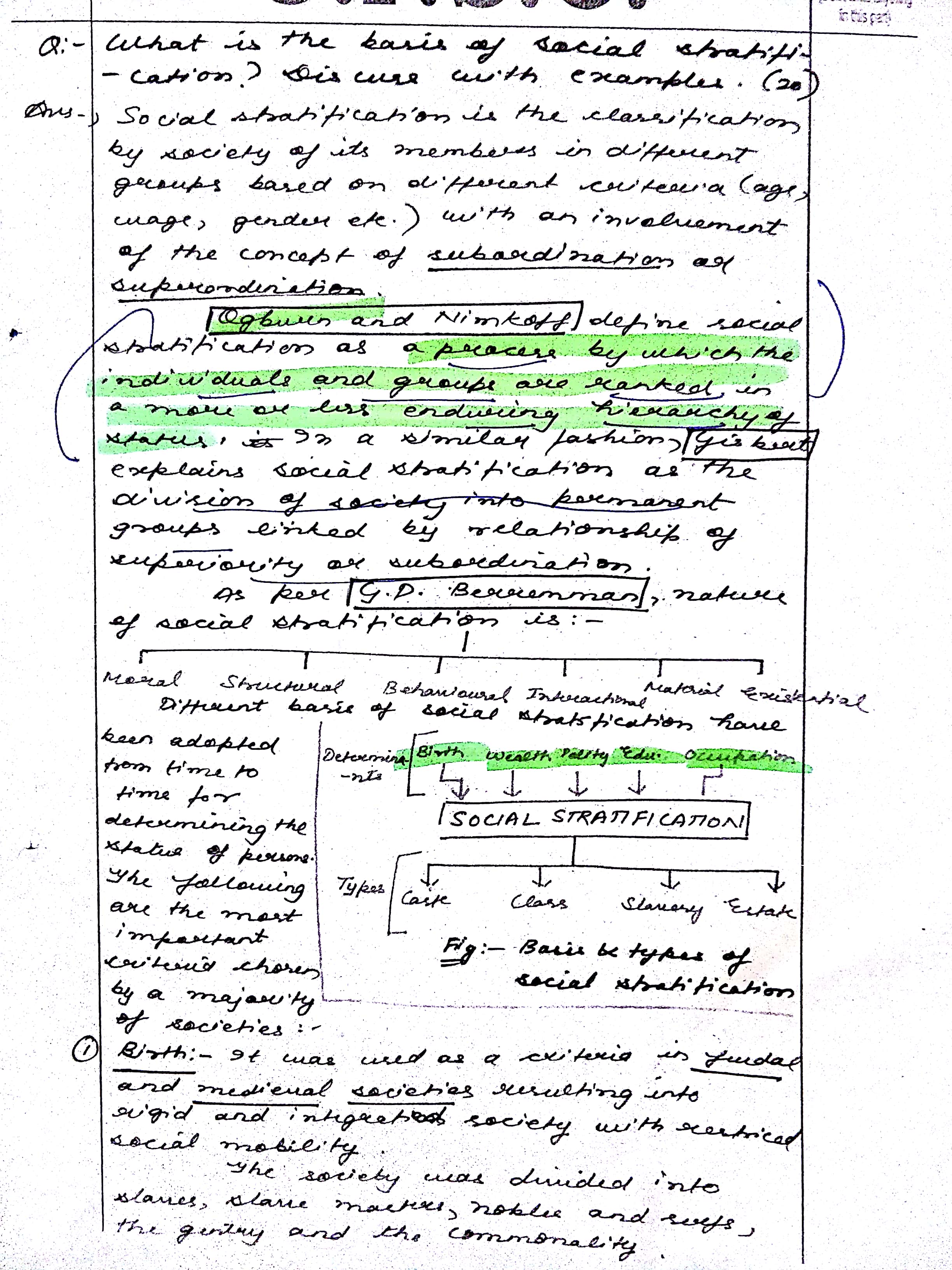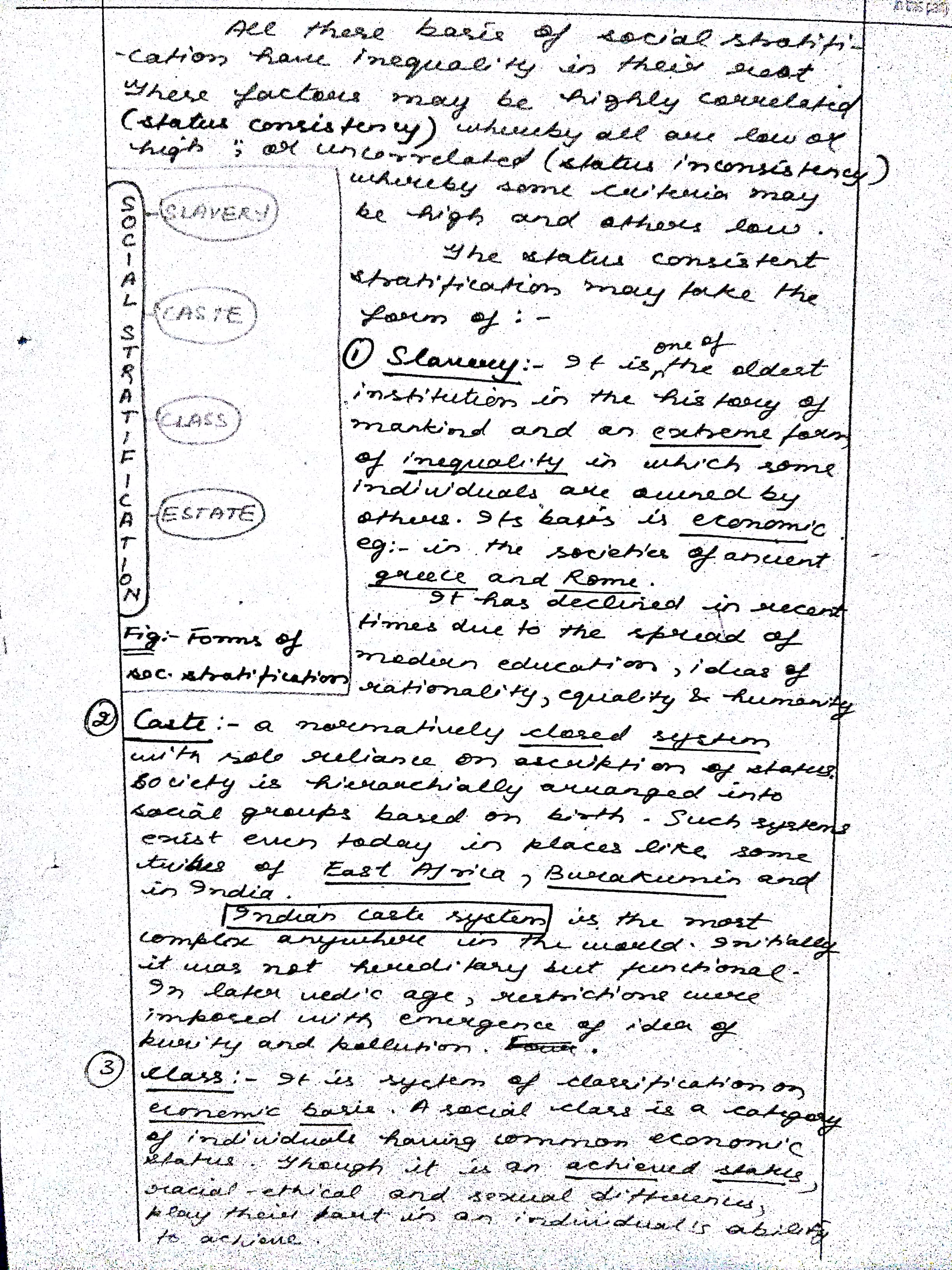social stratification done 1-2




Dipankar Gupta. Indian sociologist.
- Stratification is different from hierarchy.
- Not all systems of stratification are identical.
- Religions like Sikhism Hinduism Islam and Buddhism are various stratification in the society and one is not better than other.
- Language nationality religion ethnicity region are basis of stratification but not heirarchy.
- Some systems are hierarchical. Male and female difference on the basis of sex but heirarchy also exists.
- Hierarchy in religion is threatening our secularism. Stratification is not the problem but hierarchy and conflict.
Major dimensions
- Basis of stratification
- Structure of stratification
- Consequences of stratification
- Future of stratification
Marx theory of stratification. Class
- earlier there was primitive Communism but later production of surplus in agriculture and private property arrived.
- Basis of stratification is economic inequality.
- Structure. Haves and have nots. Bourgeoisie and proletariat in capitalism. Lord and serf in feudal system.
- Consequences. Class struggle will create socialism and then communism.
- Criticism
- Max Weber. Industry will grow and so will bureaucracy. There will be middle class emergence.
- Ralf dahrendorf.
- Revolution is impossible because capital will decompose and decentralized. Today mutual funds and share market.
- Labour will decompose. Today labour is the CEO bureaucrat clerk and capitalist.
- State has become welfare state
- Rise of middle class. Social mobility high. SC ST OBC gradually improving.
Talcott Parsons theory of stratification. Value consensus-based.
- Basis. Values and norms consensus based. Like Doctor is more valued than tax officer.
- there is conformity to the norms and Society rewards the people who conform to the norms.
- Structure. Stratification is based on conformity. People at the top or conformists and at the bottom are not.
- Therefore people have the position according to the ability and capability.
- Consequences
- It is inevitable because society needs people with different abilities
- stratification helps integrate the society and individual. Therefore it is functional.
- Stratification will remain.
- Criticism
- this theory is applicable on achievement based society. But in reality it is completely achievement based. Caste system big proof.
- stratification is not always functional but divides the society sometime. Naxalism challenge the state.
- Value consensus not always there.
Davis and moore theory. Some principles of stratification
- there are important position in society and there is scarcity of talent to fulfill those positions. If there is no stratification talent will not be attracted and they will not work hard.
- Basis. there are differential position in society associated with different awards. Therefore society becomes stratified.
- Society is made up of positions
- Some positions are more important than others
- These positions have higher reward
- But scarcity of talent in Society. So higer reward needed
- Talent needs training and skills. This needs compensation in form of High reward.
- Without stratification and talent the society will not function.
- Criticism by MM Tumin.
- How to judge functional importance of a position. It is value loaded arguments. But David and moore argue that it is based on uniqueness and dependency. Doctors are few and Society depends on the nurse are more available so not much important.
- Society does not provide equal opportunities. So rewards cannot be functional.
- Stratification creates division society and discuss. Therefore it is not functional. But Davis & Moore argue that stratification is everywhere and universal therefore it is proof that it is functional and inevitable..
- Not applicable to asceiptive society. Does not take care of Elite recruiting elites. Inequality in society is created by stratification. People cannot escape poverty cycle
Ulrich Beck. Risk based theory
- Society will stratify on the basis of hazards and in securities.these risks are induced by modernization and Technology. Nuclear radiation, environment pollution and terrorism.
- Anthony giddens defines a risk society as a society increasingly preoccupied with the future. This creates a notion of risk.
Warner. theory on reputation approach.
- Based on other people judging others.
- presence of classes gives stability to the society because each class has its own culture which reduces inter strata conflict.
- Criticism
- Today's society is individualized therefore others cannot be judge others reputation
- The different people have different perspective about reputation of others.
Weber theory. Trinitarian model. Used by Andre beteille in his book caste class and power.
- Basis of stratification.
- Class. Class means a place in the market. Class as a group lacking self consciousness.
- Status
- Party. Political party
- Structure. Four classes
- Bourgeoisie
- White collared property less class
- Petty bourgeoisie
- Manual workers. Shrinking due to automation
- Revolution is a distinct possibility. Stratification will stay.
- Jayaram 1987. Stratification refers to the idea that society is divided into patterned structure of unequal groups, and usually implies that this structure tends to persist across generations.